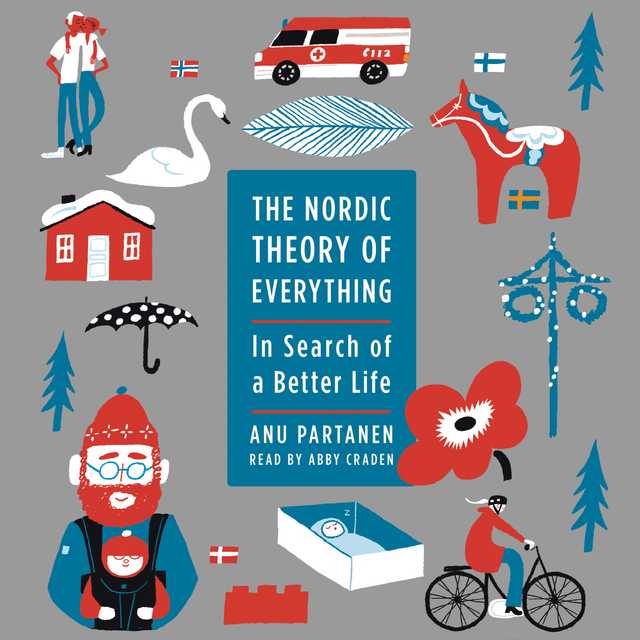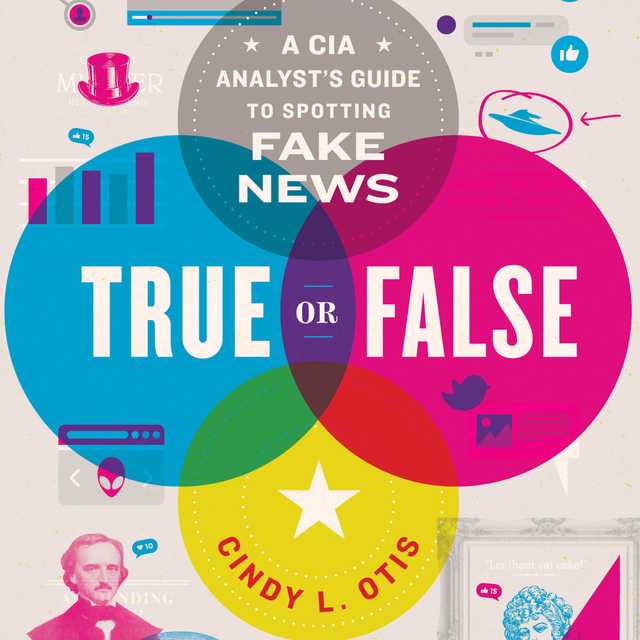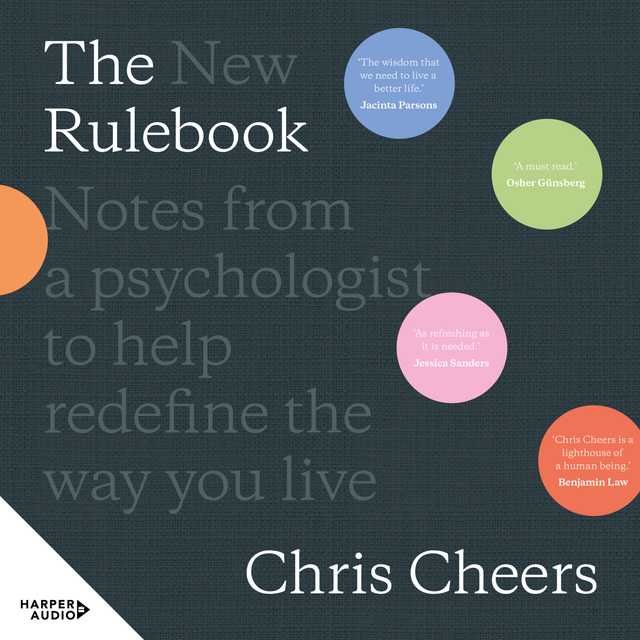The Nordic Theory of Everything Audiobook Summary
A Finnish journalist, now a naturalized American citizen, asks Americans to draw on elements of the Nordic way of life to nurture a fairer, happier, more secure, and less stressful society for themselves and their children.
Moving to America in 2008, Finnish journalist Anu Partanen quickly went from confident, successful professional to wary, self-doubting mess. She found that navigating the basics of everyday life–from buying a cell phone and filing taxes to education and childcare–was much more complicated and stressful than anything she encountered in her homeland. At first, she attributed her crippling anxiety to the difficulty of adapting to a freewheeling new culture. But as she got to know Americans better, she discovered they shared her deep apprehension. To understand why life is so different in the U.S. and Finland, Partanen began to look closely at both.
In The Nordic Theory of Everything, Partanen compares and contrasts life in the United States with life in the Nordic region, focusing on four key relationships–parents and children, men and women, employees and employers, and government and citizens. She debunks criticism that Nordic countries are socialist “nanny states,” revealing instead that it is we Americans who are far more enmeshed in unhealthy dependencies than we realize. As Partanen explains step by step, the Nordic approach allows citizens to enjoy more individual freedom and independence than we do.
Partanen wants to open Americans’ eyes to how much better things can be–to show her beloved new country what it can learn from her homeland to reinvigorate and fulfill the promise of the American dream–to provide the opportunity to live a healthy, safe, economically secure, upwardly mobile life for everyone. Offering insights, advice, and solutions, The Nordic Theory of Everything makes a convincing argument that we can rebuild our society, rekindle our optimism, and restore true freedom to our relationships and lives.
Other Top Audiobooks
The Nordic Theory of Everything Audiobook Narrator
Abby Craden is the narrator of The Nordic Theory of Everything audiobook that was written by Anu Partanen
Anu Partanen’s work has appeared in the New York Times and the Atlantic. A journalist in Helsinki for many years, she has also worked at Fortune magazine as a visiting reporter through the Innovation Journalism Fellowship at Stanford University. She lives in New York City.
About the Author(s) of The Nordic Theory of Everything
Anu Partanen is the author of The Nordic Theory of Everything
More From the Same
- Publisher : HarperAudio
- Abraham
- American Gods [TV Tie-In]
- Dead Ringer
- House of Sand and Fog
- Prey
The Nordic Theory of Everything Full Details
| Narrator | Abby Craden |
| Length | 10 hours 28 minutes |
| Author | Anu Partanen |
| Category | |
| Publisher | HarperAudio |
| Release date | June 28, 2016 |
| ISBN | 9780062643186 |
Subjects
The publisher of the The Nordic Theory of Everything is HarperAudio. includes the following subjects: The BISAC Subject Code is General, Social Science, Sociology
Additional info
The publisher of the The Nordic Theory of Everything is HarperAudio. The imprint is HarperAudio. It is supplied by HarperAudio. The ISBN-13 is 9780062643186.
Global Availability
This book is only available in the United States.
Goodreads Reviews
Jessica
June 06, 2019
Horrifying. I kept having to put it down, because it was too depressing. A Finnish journalist, now an American citizen, breaks down the way the Finnish system of healthcare, school, and taxation works to show how absolutely SCREWED America is unless we make drastic (but perfectly logical) changes. She talks about the Nordic theory of love: by freeing up families from the burdens of working extra hours to afford healthcare or better schools or elder care, you free them up to love their families without strings attached, to take care of themselves mentally and physically, and have the time and the solid foundation to achieve their dreams. It made me want to cry.
Laurie
November 10, 2016
The ideas shared by Anu Partanen are practical, beneficial to all, and make (to me) strong common-sense, provoking in me a response of "Why aren't we doing this here?" (with "here" being the United States.) Yes, I know. The U.S. is a larger, more diverse country than the Nordic countries. But that is not the point. The point lies in the philosophy of how we believe people should be treated. Partanen's book covers education, health care, family values, human-organization relationships, and the Nordic Theory of Love.It is this last, The Nordic Theory of Love, that helps explain the philosophic approach of the Nordic countries to its citizens. And it is helpful to clarify that the Nordic countries are governed by the citizens for the citizens. "For the citizens of the Nordic countries, the most important values in life are individual self-sufficiency and independence in relation to other members of the community." Further, a "core idea is that authentic love and friendship are possible only between individuals who are independent and equal."...the overarching ambition of the Nordic societies during the course of the twentieth century, and into the twenty-first, has not been to socialize the economy at all, as is often mistakenly assumed. Rather the goal has been to free the individual from all forms of dependency within the family and in civil society; the poor from charity, the wives from husbands, adult children from parents, and elderly parents from their children.What does all this boil down to in practical terms? The government uses its income from taxes to fund social services that make it possible for individuals to live their lives unencumbered by reliance on others for those services. Companies are freed from having to provide health insurance. One spouse does not have to rely on the other spouse for health insurance. Children are able to become independent upon graduating from school. (They do not have tuition bills or loans because higher education is free.) The government makes possible a range of services that are available to every single citizen.I urge anyone who sees this review and reads it, to then go ahead and read Anu's book. As it did for me, it may open your mind to ideas not thought of, and convince you there are, indeed, other ways to run a country for the people, by the people.
Lydia
April 09, 2016
This book makes me want to move to Finland.
Luke
July 06, 2017
I originally picked up this book because I was curious about the Nordic countries and the social policies that underpin their economic strength and happy populations. I learned a great deal about the successful education, healthcare, and labor policies there, but what I also got was a comparison of life in the Nordic region with life in the United States. These two parts of the world share many democratic values such as freedom, independence, and equality. But they differ in their practical approaches toward these goals.The central theory of the book and a core tenet of policies in the Nordic region is the Nordic theory of love, or more precisely the Swedish theory of love. It is the idea that authentic friendship can only exist between independent individuals who need not rely on each other, who are in no way dependent on one another. The Nordic countries have built their societies around this notion. A counterexample taken from the US would be someone who does not work in order to care for a child and who must rely on their spouse to provide health insurance that makes healthcare affordable. The caregiver's dependence on their spouse for healthcare can become a source of resentment. This next example, taken from education, does not demonstrate the theory as clearly, but it resonates strongly with me. Only by providing the same high quality education to citizens can you guarantee that they will have equal access to opportunities in life and not become unnecessarily reliant on one another. With its structure and perspective, the book is able to present and tackle difficult policy questions. The book presents social policies in the Nordic countries - and the Nordic theory of love that lies at their core - through a simple, human-centric structure. The author presents the individual's relationships toward various arms of the state. She begins with birth, childcare, family leave policies, and care for family members across the age spectrum before proceeding to education, healthcare, taxes, labor, and business. Partanen's perspective as a Finnish citizen married to an American living in New York allows her to examines these policies and relate them to an American audience. Her ties to American and Nordic society help her to deliver praise and criticism judiciously. As the book's title suggests, the author is really searching for a better life, one that combines aspects of life in both parts of the world. The book really lit a fire in me. Below are a few thoughts on the state of affairs in the US in relation to the Nordic world:I see the social policies of the Nordic countries as offering a much more democratic way of life than the United States, where we are witnessing the erosion of social mobility and exacerbation of inequality. The greatest predictor of academic success in the United States is the affluence of an individual's family. How can a nation call itself democratic when the biggest predictor of success is the family you're born into?Born into above-average circumstances, I am prone to apathy when it comes to social policy in the US. This book served as a wakeup call. Americans need to realize that the arrangements offered by the government for healthcare, education, work, and relationships are substandard for a nation as prominent and wealthy as the US. Here are a couple of really stupid things that persist in the US. First, schools are funded at the local level. This means that some schools are funded at many times the level of others, and that the quality of education a kid receives is based on the wealth of their neighborhood, city, or county. Second, healthcare is provided by employers. Why should businesses provide this social benefit and bear the financial and administrative costs? Even those who are fortunate enough to have health insurance end up paying for those who don't and seek emergency care in hospitals - through the rising cost of healthcare and through taxes. I definitely recommend reading this book.
Elizabeth
December 01, 2018
I’m ready to move to Finland. I’m used to ice, snow, and wind here in South Dakota, and Finland’s approach to freedom from want seems very attractive. What could be wrong with a system that provides each of its citizens with health care, day care, excellent schools from Pre K through PhD, and a reliable pension system? Taxes you say? If you count the cost of day care, after school care, health insurance, and a university education, the Finns get a better deal financially. Taxes in Finland are not much higher if you sum all of the taxes Americans pay (for budget nerds, this would be to Effective Total Tax Rate) vs. taxes the Finns pay. In exchange for their taxes, citizens don’t have to worry about the astronomical cost of higher education, for example. We sent two children to elite universities at a cost of nearly $200,000. In Finland, this would have been free. Americans are in love with the libertarian definition of freedom, but how free are we really when we are married to the jobs we need to afford health care and to provide social minima for our families. The author makes a convincing argument that the true test of national policy is gross national happiness and freedom from dependency on the state or family for bailing you out.As a political scientist, I was aware of the flaws in the US system but didn’t know much about the Nordic alternative view. The book is well worth reading for that view.
Laila
March 14, 2018
Anu Partanen, a Finnish journalist, examines the disparity between the American dream and its current reality, and shows how America might adapt its current healthcare, childcare, education, and taxation approaches to resemble more effective models demonstrated by Scandinavian countries. She points out the irony of a county forcing the majority of its people into systems of inequality and dependence under the illusion of preserving their freedom, while asking the relevant question: can you truly claim to have freedom if all the people in a country do not have equal opportunity? Partanen dispels the libertarian myths about Scandinavian "welfare states", while acknowledging that what the U.S. needs is not bigger government, but smarter government. Americans are simply unaware of "how much better things could be." In a county with an ever-growing class divide and severe inequality, America is lagging behind other modern democracies by not valuing healthcare and education as basic human rights. As Partanen states, "The lottery of whether or not a child is born into the sort of family wealth necessary to fund a private education should have nothing to do with it. The U.S. system of paying for education...firmly cements the dependency of almost every child, first and foremost, on his or her parents' wealth- or lack of it. A county has to prepare not just some, but all of its population well. In the country that experimented with perfecting freedom and democracy in the first place, shouldn't it be possible to rethink government in the twenty-first century?" A powerful and timely question indeed.
Chris
November 29, 2016
Finnish-born journalist Anu Partanen is too polite to say it herself, so I'll say it for her. Compared to what the Finns and citizens of other Nordic countries are doing, the way Americans handle wages, unemployment, health insurance, and education stinks. Parnatanen shows how the Finnish system fosters ambition and success by securing each individual's connection to basic resources, education, and medical care. The key to understanding the system, according to her, is that it is not altruistic. All Finns pay into the system, and all Finns expect to benefit. These are shared resources, not handouts. When you contrast this approach to the American approach -- which leaves supposedly free citizens dependent on family members or employers, which makes child care a nightmare and getting a good education an exercise in geography, where social mobility is falling like a rock -- I'm a little puzzled that Partanen didn't tell her American boyfriend-now-husband to suck it up, learn Finnish and move. I can see the appeal and excitement of being a writer in New York City, but Ed Miliband seems to have been right: "If you want the American Dream, go to Finland."
Nina
March 09, 2017
Fantastic book. No wonder Bernie is a fan of Democratic Socialism. Now I'm a fan too. The book focuses on the Nordic way of life... but that's code for Finland. Although the book does talk some about Norway and Sweden. I knew about how great Finland is from my Finnish mother in the privacy of our own home. Finland is not a country of braggers, so this Finnish author went against the grain to get the word out. Now if only we would listen.
Abby
October 13, 2022
I like how this book tackles head-on the most salient arguments that come from Americans about Nordic values, lifestyles, and governmental policies. The book is a bit long and repetitive, especially towards the middle-end. The most striking points are made early on. But I think some of the repetitiveness is actually helpful in driving home the sincerity of the author, whether or not you see her beliefs/points as valid. I'm sold. I want to live in a Nordic country. Uh, maybe. Not sure about those long winters. Or maybe, as my friend would say, just maybe I've just subjected myself to 10.5 hours of propaganda? It's good food for thought, even if you dismiss it all as propaganda. I think that most Americans would agree that there are problems with America these days. Perhaps some of those problems are worth questioning or exploring in new ways. It's useful to have an outsider's perspective. This book made me reconsider the quality of life I have, and also the general sense of financial insecurity that I never expected to have when I was growing up. It pointed a spotlight on the visible draining of wealth (generational, income, etc) that quite a lot of middle class and upper class Americans are experiencing.
Leahbh
October 24, 2016
Very interesting read - but the author's arguments in favor of the US adopting the policies described seem naive when she doesn't address:1. The US' investment in military spending and incarceration - from the Washington Post, 2/9/16: "the International Institute for Strategic Studies released its Military Balance 2016 report... the report showed... that U.S. military spending easily dwarfed the rest of the world. With a defense budget of around $597 billion, it was almost as much as the next 14 countries put together and far larger than the rest of the world. " and from Science News 9/7/16 "The cost of incarceration in the United States exceeds $1 trillion, or six percent of gross domestic product." This estimates the total cost including costs to families and social costs. The costs of corrections, alone, is frequently cited as $80 billion.2. The sociopolitical climate in the US that is hostile to or ambivalent about issues such as having both parents in the workforce, paid parental leave, day care, public education, etc. Politicians cynically manipulate citizens through distracting "culture wars" and help engender resistance to programs and policies that would actually make a positive difference in their constituents' lives.I guess these issues were not the point of her book, but I don't see America adopting these common sense policies without a reckoning of the actual facts of our society, either.
Frequently asked questions
Listening to audiobooks not only easy, it is also very convenient. You can listen to audiobooks on almost every device. From your laptop to your smart phone or even a smart speaker like Apple HomePod or even Alexa. Here’s how you can get started listening to audiobooks.
- 1. Download your favorite audiobook app such as Speechify.
- 2. Sign up for an account.
- 3. Browse the library for the best audiobooks and select the first one for free
- 4. Download the audiobook file to your device
- 5. Open the Speechify audiobook app and select the audiobook you want to listen to.
- 6. Adjust the playback speed and other settings to your preference.
- 7. Press play and enjoy!
While you can listen to the bestsellers on almost any device, and preferences may vary, generally smart phones are offer the most convenience factor. You could be working out, grocery shopping, or even watching your dog in the dog park on a Saturday morning.
However, most audiobook apps work across multiple devices so you can pick up that riveting new Stephen King book you started at the dog park, back on your laptop when you get back home.
Speechify is one of the best apps for audiobooks. The pricing structure is the most competitive in the market and the app is easy to use. It features the best sellers and award winning authors. Listen to your favorite books or discover new ones and listen to real voice actors read to you. Getting started is easy, the first book is free.
Research showcasing the brain health benefits of reading on a regular basis is wide-ranging and undeniable. However, research comparing the benefits of reading vs listening is much more sparse. According to professor of psychology and author Dr. Kristen Willeumier, though, there is good reason to believe that the reading experience provided by audiobooks offers many of the same brain benefits as reading a physical book.
Audiobooks are recordings of books that are read aloud by a professional voice actor. The recordings are typically available for purchase and download in digital formats such as MP3, WMA, or AAC. They can also be streamed from online services like Speechify, Audible, AppleBooks, or Spotify.
You simply download the app onto your smart phone, create your account, and in Speechify, you can choose your first book, from our vast library of best-sellers and classics, to read for free.
Audiobooks, like real books can add up over time. Here’s where you can listen to audiobooks for free. Speechify let’s you read your first best seller for free. Apart from that, we have a vast selection of free audiobooks that you can enjoy. Get the same rich experience no matter if the book was free or not.
It depends. Yes, there are free audiobooks and paid audiobooks. Speechify offers a blend of both!
It varies. The easiest way depends on a few things. The app and service you use, which device, and platform. Speechify is the easiest way to listen to audiobooks. Downloading the app is quick. It is not a large app and does not eat up space on your iPhone or Android device.
Listening to audiobooks on your smart phone, with Speechify, is the easiest way to listen to audiobooks.






























